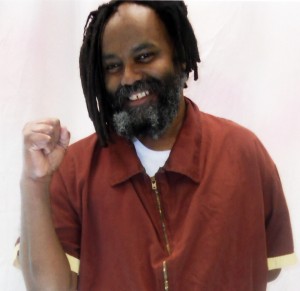Who Is Mumia Abu-Jamal?
April 2, 2015 | Revolution Newspaper | revcom.us

Mumia Abu-Jamal, one of the most well-known political prisoners in the U.S., has been unjustly imprisoned in Pennsylvania for nearly 35 years. On December 9, 1981, Mumia was driving a cab on a downtown Philadelphia street. He saw a cop viciously beating his brother with a metal flashlight. Mumia rushed to the scene. He was shot in the chest by the cop, and was found sitting on the sidewalk in a pool of his own blood. The cop lay nearby, dying from a bullet wound. Arriving police attacked Mumia, who was well known to them as a revolutionary journalist and a former Black Panther, and arrested him for murder of the cop.
Mumia was carrying a gun for self-protection as a late-night cab driver. But the bullet taken from the slain officer was never matched to Mumia's gun. His gun was never tested to see if it had been fired, nor were his hands tested to show if he had recently fired a gun. In fact, the medical examiner's report listed the fatal bullet as a different caliber than Mumia's gun, but the jury never saw this report. Police claimed that Mumia stood over the fallen officer, firing repeatedly at him but hitting him only once in the head. Yet photographs that surfaced years later showed no marks on the sidewalk from the bullets that allegedly missed the officer.
In his 1982 trial Mumia was denied the right to serve as his own attorney and was barred from the courtroom for half his trial. Racial bias in jury selection resulted in an overwhelmingly white jury. And a court reporter overheard the trial judge saying that he was going to help the cops "fry the n****r."
Witnesses who told of seeing a different person commit the shooting and flee the scene were ignored and never heard by the jury. The prosecution claimed that Mumia had confessed—a confession that cops only "remembered" months after the incident. Yet the jury only heard the phony confession story and never saw the official police report that stated Mumia had made no statement. Not surprisingly under these circumstances, Mumia was convicted and sentenced to death.
Documents obtained for Mumia's appeal process in 1995 showed that he had been under government surveillance since he was 14 years old. A protest leader in high school, he became a young Minister of Information for the Black Panther Party in Philadelphia. In following years he attended college and became a respected radio journalist in Philadelphia.
Undeterred by his incarceration, Mumia continued and further developed as a journalist behind bars, writing a weekly syndicated column and authoring several books. When the governor signed a death warrant in 1995, a surging mass movement in his support quickly developed and prevented Mumia's execution. Even so, Mumia continued to sit alone 22 hours a day in an isolation cell the size of a bathroom, allowed to see his family and lawyers only through a plexiglass window. His refusal to capitulate in the face of all this exemplifies the courage, the dedication, and the revolutionary potential of the millions held in this country's prisons, and this was an inspiration for broad numbers of people.
The struggle to free Mumia, which has been waged worldwide, brought forward a whole generation of students who were radicalized. This movement played an important role in changing many people's minds not just around the death penalty, but in looking at the injustices of the system as a whole.
Mumia spent a quarter of a century in solitary confinement on death row until courts overturned his death sentence while affirming his conviction, leaving him to face the prospect of life in prison without parole. Through all this, Mumia has continued to denounce the crimes against humanity perpetrated by this system in both audio and written commentaries.
Volunteers Needed... for revcom.us and Revolution
If you like this article, subscribe, donate to and sustain Revolution newspaper.
